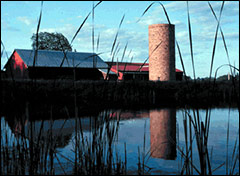Mississippi River
-
With the Katrina-anniversary media gone, the hard work continues
A version of this piece originally appeared on the Rockefeller Philanthropy Advisors website. FEMA trailer camp, Plaquemines Parish, La. Photo: Marni Rosen The many communities of color along the Gulf Coast, be they African American, Creole, Native American, or Vietnamese American, have much in common — and not just because they’re still struggling to get […]
-
Granted, it’s early yet
Just met with Laura Carstens, planning services manager for Dubuque. The money quote: “For years, we turned our back on the river. Now we’re making it our front door.” Later today, Sarah and I will get out on the river for the first time. The tourist riverboat stopped running this weekend because the weather turned, […]
-
… or Kansas, for that matter
Here’s what the sign says on the back of the bathroom door in our hotel: Hotel Laws of Iowa Fixing, Limiting, and Determining the Liability of Keepers of Hotels, Inns, Eating-Houses, and Steamboat Owners to Inmates Thereof. Sorry, was that … steamboat owners? Holy crap.
-
A meeting of the minds in the Masterpiece on the Mississippi
There’s no free lunch — unless you happen to be a Grist reporter crashing a sustainability conference in Dubuque. I showed up, hungry, for a 12 p.m. presentation by City Manager Mike Van Milligen that was kicking off a three-day Sustainable Design Assessment Team visit. I was rewarded not only with more inspiring examples of […]
-
Grist pulls a Huck Finn
Grist is rollin’ (rollin’!) on the river this week, and we’re taking you with us. We’re bound for the Mississippi — the legendary waterway recently deemed an “orphan” of the federal government. Just call us Sarah van Sawyer and Huckleberry Wroth. We’ve ventured here to find out how three cities are reinventing their once-industrial waterfronts, […]
-
While industrial agriculture fouls the Mississippi, the EPA cowers in the corner
Industrial agriculture thrives on its ability to skulk away from — or, to use economist’s argot, "externalize" — the costs of its considerable ecological messes. Often, it does so with the tacit approval of the federal government, in direct violation of federal law. In Iowa, for example, the state’s 2,100 CAFOs (confined-animal feedlot operations) regularly […]
-
How the nation’s breadbasket is poisoning its own water supply
In late September, the corn and soybean fields of the lower Missouri River floodplain are a lovely dull brown, nearly ready for harvest. The row crops sprawl as far as the eye can see, their regimental march broken only by levees, gravel roads, the occasional band of cottonwoods, and the endless tracks of the Burlington […]
-
On moving to New Orleans, a city defined by water
Wayne Curtis is a freelance writer who’s written for The New York Times, Atlantic Monthly, American Scholar, Preservation, and American Heritage, and is the author of And a Bottle of Rum: A History of the New World in Ten Cocktails. He recently traded Maine winters for New Orleans summers. Thursday, 24 May 2007 NEW ORLEANS, […]
-
A virtual walking tour of Columbia, Miss., with Charlotte Keys of Jesus People Against Pollution
In 1977, a factory in Columbia, Miss., that had been manufacturing Agent Orange was rocked by an explosion. The owner, Reichhold Chemical Inc., shuttered the facility and abandoned or buried thousands of barrels of toxic waste near the water supply of the predominantly poor, African-American neighborhood where it had operated; flooding and leaks followed. In […]
